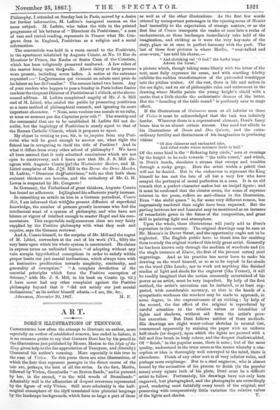POSITIVISM IN PARIS. [To THE EDITOR OF THE "SPECTATOR."] SIR,—Having
had the advantage during the past summer of hear- ing some of Mr. Congreve's Sunday lectures on the Positive
Philosophy, I attended on Sunday last in Paris, moved by a desire for further information, M. Lafitte's inaugural sermon on the same subject. M. Lafitte, who takes the title in the printed programme of his lectures of " Directeur du Positivisme," a man of vast and varied reading, represents in France what Mr. Con- greve does in England, Positivism as a religion and a social reformation.
The conventicle was held in a room sacred to the Positivists, in the apartment inhabited by Auguste Comte, at No. 10 Rue de Monsieur le- Prince, the Kaaba or Santa Casa of the Comtists, which has been religiously preserved unaltered. A few relics of the master hung upon thelwalls. About thirty or forty persons were present, including seven ladies. A notice at the entrance requested :—" Lespersonnes qui viennent en sabots sont pries de lea laisser au has de l'escalier." The sermon lasted two hours. Any of your readers who happen to pass a Sunday in Paris before Easter can hear the eloquent Director of Positivism at 1 o'clock, at the above- named address. M. Lafitte complained angrily of Mr. J. S. Mill and of M. Littre, who misled the public by presenting positivism as a mere method of philosophical research, and ignoring its more important character. "None, nous voulons use morale et un culte, et nous ne sommes pas des Capncins pour celtt !" The worship and the ceremonial that are to be established M. Lafitte did not de- scribe, but the hagiology of Positivism is nearly equal to that of the Roman Catholic Church, which it proposes to upset.
My object in writing to you, Sir, is to „inquire from any Posi- tivist who will be good enough to answer me, what right the School has in arrogating to itself the title of Positive ? And in what it differs from every other school of philosophy ? We have all been assured that it only admitted conclusions which are not open to controversy, and I learn now that Mr. J. S. Mill dis- agrees with Auguste CointeLini the Westminster Review, and M. Littre complains of Mr. J.S. Mill in the Revue des Deer Mender. M. Lafitte, " Directeur du rositivisme," tells me that both these eminent thinkers are heretics, and the orthodoxy of Mr. G. H. Lewes is suspected by Mr. Congreve !
In Germany, the Fatherland of great thinkers, Auguste Comte has found no adherents. InlEngland his adherents yearly increase.
In consulting an article on him in a German periodical, Unsere Zeit, I am informed that with:the present diffusion of superficial knowledge, the number of persons greatly increases who feel the intellectual want of a system of philosophy, and who have not leisure or vigour of intellect enough to master Hegel and his com- mentators. This respectable andj numerous class are very fairly supplied by the Positive philosophy with what they seek and require, says the German reviewer.
And A. Comte himself, to the surprise of Mr. Mill and the regret of M. Litia-e, surrenders at the end of his work (VI., 639) the very basis upon which his whole system is constructed. He claims in express terms an unlimited licence "of adopting without any vain scruple hypothetical conceptions in order to satisfy within proper limits our just mental inclinations, which always turn with an instinctive predilection towards simplicity, continuity, and generality of conception." "A complete dereliction of the essential principles which form the Positive conception of Science," adds Mr. J. S. Mill, in his book on Comte. (p. 62.) I have never had any other complaint against the Positive philosophy beyond that it "did not satisfy our just mental inclinations," as its author himself admits.—I am, Sir, &c., Athenaeum, November 20, 1867. M. P.



































 Previous page
Previous page